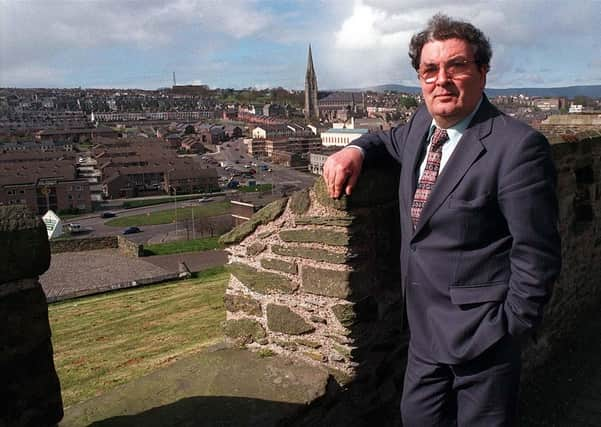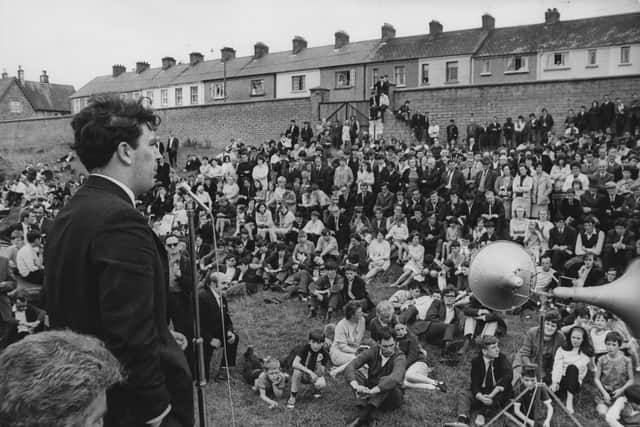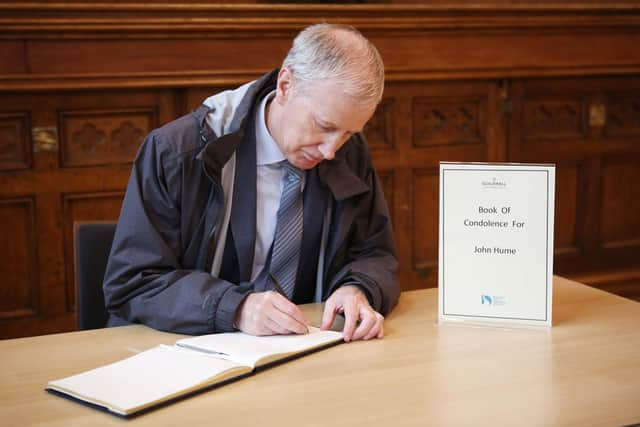Gregory Campbell: Nationalist leaders did not highlight, let alone prevent, the unionist exodus from the cityside of Londonderry


I know because I didn’t live too far away.
Therefore when considering his legacy, it was entirely appropriate to recognise his firm anti-violence stance.
John and I were of different generations, but we were both working class boys living on either side of the River Foyle.


Advertisement
Hide AdAdvertisement
Hide AdFate had decided he would be born Roman Catholic and I Protestant.
The bricks and mortar in his house came from the same quarry as built mine. The unemployment and poor housing conditions on my side of the Foyle were the same as on his side.
He began his political career in the mid-sixties while mine began in the late seventies. Our political careers overlapped in the early 1980s when we both were at Stormont, and then as MPs for adjoining constituencies from 2001 to 2004.
During that time, despite our political differences we enjoyed a cordial personal relationship and worked together to deliver for people in our constituencies.


Advertisement
Hide AdAdvertisement
Hide AdThere has been a myriad of ‘defining moments’ in the lives of people here over the last 50 years but there have been two periods that more than any other shaped the Northern Ireland of 2020.
The first period was the birth of the Troubles from 1968 onwards, the second period was the ending of those same Troubles.
In the midst of earnest tributes to John Hume, we must not forget or be mistaken about what happened in those two periods.
The period 1969-72 was the one with the highest death toll in the Troubles. What happened then to the unionist minority in the City of Hume and Campbell has been almost completely overlooked in the commentary of recent days.
Advertisement
Hide AdAdvertisement
Hide AdThe exodus of unionists occurred when peaceful nationalism and violent republicanism was on the rise.
Nothing was done by nationalist leaders to highlight it let alone prevent it.
If in a unionist majority city virtually an entire nationalist minority in the main part of that city, had fled, mostly under threat, with dozens of funeral corteges being their final farewell, would those leaders have been so silent?
If this had happened when any unionist leader was prominent, it would have seen them pilloried and rightly criticised, yet this is what happened between 1969 and 1972 in Londonderry to unionists.
Advertisement
Hide AdAdvertisement
Hide AdIt wasn’t highlighted by mainstream nationalist leaders at the time, and no mainstream media outlet referred to it this week. The much vaunted ‘need for balance’ was conspicuously absent.
At the other end of the timescale was the 1989-94 period just before the ceasefires. At that early stage, only a few people were aware of the Hume/Adams discussions.
Very few were also aware of the scale of the security services infiltration of the Provisional IRA.
The wider public had no knowledge of those who would later be outed as agents from within the secret ranks of the IRA.
Advertisement
Hide AdAdvertisement
Hide AdMartin McGuinness in the documentary ‘Real Lives’ had said in the early 1980s that if someone showed the IRA ‘another way’ to achieve their objective, apart from violence, they would take it.
The mainstream journalistic narrative following John Hume’s death both locally and internationally was effectively that the IRA had to be cajoled and dragged into a gradual move towards peace.
Very few journalists recognised that the IRA was desperately seeking a way out of their terror tactic.
A Troubles weary people were tiring of their terror and their best ‘activists’ were increasingly known to be agents.
Advertisement
Hide AdAdvertisement
Hide AdThat is why the Provos made their long overdue move towards peace.
Anyone declaring that peace would not have happened without John Hume, must give voice to the view that a desperate, depleted IRA were looking for an escape route with a long-term united Ireland fig leaf for cover.
• Gregory Campbell is DUP MP for East Londonderry
——— ———
A message from the Editor:
Thank you for reading this story on our website. While I have your attention, I also have an important request to make of you.
With the coronavirus lockdown having a major impact on many of our advertisers — and consequently the revenue we receive — we are more reliant than ever on you taking out a digital subscription.
Advertisement
Hide AdAdvertisement
Hide AdSubscribe to newsletter.co.uk and enjoy unlimited access to the best Northern Ireland and UK news and information online and on our app. With a digital subscription, you can read more than 5 articles, see fewer ads, enjoy faster load times, and get access to exclusive newsletters and content. Visit https://www.newsletter.co.uk/subscriptions now to sign up.
Our journalism costs money and we rely on advertising, print and digital revenues to help to support them. By supporting us, we are able to support you in providing trusted, fact-checked content for this website.
Alistair Bushe
Editor